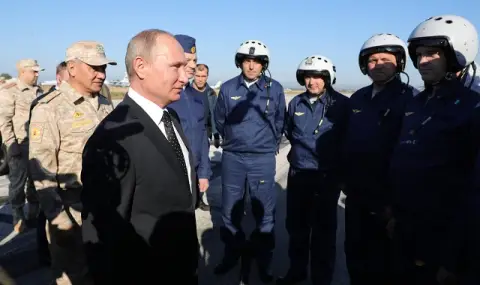Russia has evacuated naval assets from its base in Tartus, Syria, which may suggest that it does not intend to send significant reinforcements to the regime of Syrian President Bashar al-Assad in the near future.
The analyst M. T. Anderson reported on December 2 that satellite images from November 30 and December 1 showed several Russian frigates at the Russian base in Tartus. Russia cannot move these ships to its Black Sea ports because Turkey applies the Montreux Convention, which prevents Russian warships from passing through Turkish straits.
This is what the Institute for the Study of War (ISW) writes in another analysis of hostilities in Ukraine.
Therefore, Russia is likely to redeploy the ships to its bases in northwestern Russia and the Kaliningrad region. Ukraine's General Directorate of Military Intelligence (GUD) said on December 3 that the Russian military command may have deployed forces of an unspecified size from its Africa Corps, the organization created by the Russian Ministry of Defense (MoD) to replace the group's operations " ;Wagner" in Africa after the death of the financier of "Wagner" Yevgeny Prigozhin in August 2023. — in Syria.
ISW cannot independently confirm the allegations, but if true, they would indicate that the Russian military command is avoiding the redeployment of regular Russian military forces from priority Ukraine to Syria.
Russia is likely concerned that Syrian opposition forces could advance south toward Hama (approximately 80 kilometers northeast of Tartus) and threaten the base, but that the Russian military command will not deploy significant reinforcements to Syria in the near future to prevented such progress.
The United States announced an additional $725 million in military aid to Ukraine on December 2.
The US Department of Defense announced its 71st tranche of military aid, including Stinger Man-Portable Air Defense System (MANPADS) missiles; HIMARS ammunition; 155 mm and 105 mm artillery ammunition and others.
US National Security Adviser Jake Sullivan said on December 2 that US President Joe Biden had asked the Defense Department to deliver the aid quickly and that the United States would "deliver hundreds of thousands of additional artillery shells, thousands of additional missiles and other critical abilities" in Ukraine between the beginning of December 2024 and mid-January 2025
Russian officials continue to maintain information operations about the prisoner-of-war exchange to portray Ukraine as unwilling to negotiate and undermine Ukrainian confidence in their government. Russian Foreign Ministry (MFA) spokeswoman Maria Zakharova said on November 27 that Russia has a list of 630 Ukrainian prisoners of war that it is ready "immediately" to exchange on a one-to-one exchange. Russian human rights ombudsman Tatyana Moskalkova published the list on December 2 and claimed that Ukraine had refused the exchange.
Secretary of the Ukrainian Coordination Staff for the Treatment of Prisoners of War, Brigadier General Dmytro Usov, said on December 3 that Russian authorities had not submitted requests for such a prisoner of war exchange through official channels, and that the published list included civilians and prisoners of war that Ukraine had already returned at home.
Usov noted that Russian authorities are only interested in exchanging prisoners of war captured by Ukrainian forces in the Kursk region. Usov said that Russian officials are trying to discredit the Ukrainian government.
ISW continues to assess that the Kremlin is likely aiming to divert attention from its efforts to end the prisoner exchange process and from persistent reports of Russian human rights abuses, including executions of Ukrainian prisoners of war.
Russia, not Ukraine, has previously shown reluctance to exchange prisoners of war, as Russia reportedly rejected Ukrainian exchange offers months before Ukraine's Kursk Oblast offensive began in August 2024.
India is reportedly trying to separate its defense industry from Russia as it increases cooperation with Western defense companies and builds its own defense industrial base. Bloomberg reported on December 3 that senior Indian officials said that India has sharply reduced its orders for defense equipment from Russia and has started buying defense equipment from Western suppliers instead.
Officials are reported to have said that India canceled plans to jointly develop and manufacture helicopters and advanced fighter jets with Russia "some time ago" and that India is unlikely to move forward with plans to lease a Russian nuclear submarine to train Indian crews, as India is building its own submarines.
An unnamed senior Indian official is reported to have said that Russian-made weapons are often cheaper than Western ones but require repairs, increasing their long-term costs. ISW previously reported other sources of heightened tension in Russia-India relations, including Indian Prime Minister Narendra Modi's visit to Ukraine on August 23 and the reported transfer of Indian artillery shells through European intermediaries to Ukraine.
